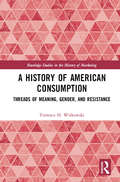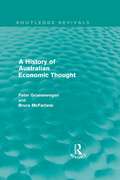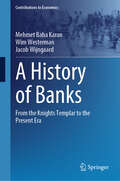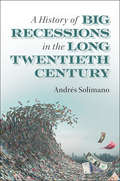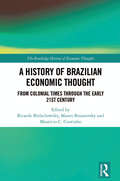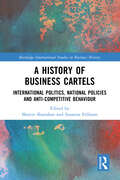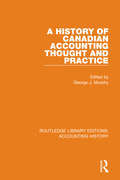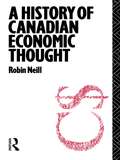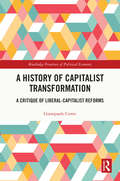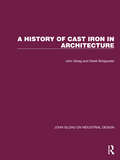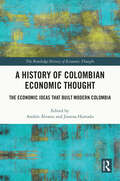- Table View
- List View
A History of American Consumption: Threads of Meaning, Gender, and Resistance (Routledge Studies in the History of Marketing)
by Terrence H. WitkowskiThe United States has been near the forefront of global consumption trends since the 1700s, and for the past century and more, Americans have been the world’s foremost consuming people. Informed and inspired by the literature from consumer culture theory, as well as drawing from numerous studies in social and cultural history, A History of American Consumption tells the story of the American consumer experience from the colonial era to the present, in three cultural threads. These threads recount the assignment of meaning to possessions and consumption, the gendered ideology and allocation of consumption roles, and resistance through anti-consumption thought and action. Brief but scholarly, this book provides a thought provoking, introduction to the topic of American consumption history informed by research in consumer culture theory. By examining and explaining the core phenomenon of product consumption and its meaning in the changing lives of Americans over time, it provides a valuable contribution to the literature on the subjects of consumption and its causes and consequences. Readable and insightful, it will be of interest to scholars and advanced students in consumer behaviour, advertising, and marketing and business history.
A History of American Economic Thought: Mainstream and Crosscurrents (The Routledge History of Economic Thought)
by Samuel Barbour James Cicarelli J. E. KingThis vital addition to the Routledge History of Economic Thought series surveys arguably the most important country in the development of economics as we know it today – the United States of America. A History of American Economic Thought is a comprehensive study of American economics as it has evolved over time, with several singularly unique features including: a thorough examination of the economics of American aboriginals prior to 1492; a detailed discussion of American economics as it has developed during the last fifty years; and a generous dose of non-mainstream American economics under the rubrics "Other Voices" and "Crosscurrents." It is far from being a native American community, and numerous social reformers and those with alternative points of view are given as much weight as the established figures who dominate the mainstream of the profession. Generous doses of American economic history are presented where appropriate to give context to the story of American economics as it proceeds through the ages, from seventeenth-century pre-independence into the twentieth-first century packed full of influential figures including John Bates Clark, Thorstein Veblen, Irving Fisher, Paul Samuelson, and John Kenneth Galbraith, to name but a few. This volume has something for everyone interested in the history of economic thought, the nexus of American economic thought and American economic history, the fusion of American economics and philosophy, and the history of science.
A History of Argentina in the Twentieth Century: Updated and Revised Edition
by James P. Brennan Luis Alberto RomeroA History of Argentina in the Twentieth Century, originally published in Buenos Aires in 1994, attained instant status as a classic. Written as an introductory text for university students and the general public, it is a profound reflection on the “Argentine dilemma” and the challenges that the country faces as it tries to rebuild democracy. Luis Alberto Romero brilliantly and painstakingly reconstructs and analyzes Argentina’s tortuous, often tragic modern history, from the “alluvial society” born of mass immigration, to the dramatic years of Juan and Eva Perón, to the recent period of military dictatorship. For this second English-language edition, Romero has written new chapters covering the Kirchner decade (2003–13), the upheavals surrounding the country’s 2001 default on its foreign debt, and the tumultuous years that followed as Argentina sought to reestablish a role in the global economy while securing democratic governance and social peace.
A History of Argentina in the Twentieth Century: Updated and Revised Edition
by Luis Alberto RomeroA History of Argentina in the Twentieth Century, originally published in Buenos Aires in 1994, attained instant status as a classic. Written as an introductory text for university students and the general public, it is a profound reflection on the “Argentine dilemma” and the challenges that the country faces as it tries to rebuild democracy. Luis Alberto Romero brilliantly and painstakingly reconstructs and analyzes Argentina’s tortuous, often tragic modern history, from the “alluvial society” born of mass immigration, to the dramatic years of Juan and Eva Perón, to the recent period of military dictatorship. For this second English-language edition, Romero has written new chapters covering the Kirchner decade (2003–13), the upheavals surrounding the country’s 2001 default on its foreign debt, and the tumultuous years that followed as Argentina sought to reestablish a role in the global economy while securing democratic governance and social peace.
A History of Auditing: The Changing Audit Process in Britain from the Nineteenth Century to the Present Day (Routledge New Works in Accounting History #Vol. 5)
by Derek MatthewsThe rise of the British accountancy profession from the late nineteenth century to the present day, and the world-wide success of its accountancy firms, were to a large extent based on the growth of the audit function. This book explores the history of the audit process in Britain, demonstrating that the characteristic features of the auditing industry are a diversity in practice based largely on the different types of clients the auditors serve. The book examines the innovation that was brought about by the staggering developments in information technology which have been seen over the last few centuries. This comprehensive history will be a useful reference tool for accounting, business and economic historians and will also be an enlightening read for all those with an interest in auditing procedures.
A History of Australasian Economic Thought (The Routledge History of Economic Thought)
by Alex MillmowThis overview of Australasian economic thought presents the first analysis of the Australian economic contribution for 25 years, and is the first to offer a panoramic sweeping account of New Zealand economic thought. Those two countries, both at the start of the twentieth century and at its end, excelled at innovative economic practices and harbouring unique economic institutions. A History of Australasian Economic Thought explains how Australian and New Zealand economists exerted influence on economic thought and contributed to the economic life of their respective countries in the twentieth century. Besides surveying theorists and innovators, this book also considers some of the key expositors and builders of the academic economics profession in both countries. The book covers key economic events including the Great Depression, the Second World War, the post-war boom and the great inflation that overtook it and, lastly, the economic reform programmes that both Australia and New Zealand undertook in the 1980s. Through the interplay of economic events and economic thought, this book shows how Australasian economists influenced, to differing degrees, economic policy in their respective countries. This book is of great importance to those who are interested in and study the history of economic thought, economic theory and philosophy, and philosophy of social science, as well as Australasian economics.
A History of Australian Co-operatives 1827-2023
by Greg Patmore Nikola Balnave Olivera MarjanovicCo-operatives provide a different approach to organising business through their ideals of member ownership and democratic practice. Every co-operative member has an equal vote regardless of his or her own personal capital investment. They take a variety of different forms, including consumer co-operatives, agricultural co-operatives, worker co-operatives and financial co-operatives. Patmore, Balnave and Marjanovic provide a perspective on Australian co-operative development within a conceptual framework and international context since the 1820s by exploring the economic, political and social factors that explain their varying fortunes. Drawing upon the Visual Historical Atlas of Australian Co-operatives, a significant database of Australian co-operatives and a variety of historical sources, this book provides a detailed historical analysis of their development, from their inception in Australia to today. Australian co-operatives were heavily dependent on state sympathy for their growth and vulnerable to ideas that challenged collective organisation such as Neo-liberalism. Despite these challenges, the co-operative business model has persisted and since 2009, there has been resurgence of interest and organisation that may provide a platform for future growth. A useful resource for practitioners, students, educators, policy makers and researchers that highlights a significant alternative business model to the Investor-Owned Business and state enterprise.
A History of Australian Co-operatives 1827–2023
by Greg Patmore Nikola Balnave Olivera MarjanovicCo-operatives provide a different approach to organising business through their ideals of member ownership and democratic practice. Every co-operative member has an equal vote regardless of his or her own personal capital investment. They take a variety of different forms, including consumer co-operatives, agricultural co-operatives, worker co-operatives and financial co-operatives.Patmore, Balnave and Marjanovic provide a perspective on Australian co-operative development within a conceptual framework and international context since the 1820s by exploring the economic, political and social factors that explain their varying fortunes. Drawing upon the Visual Historical Atlas of Australian Co-operatives, a significant database of Australian co-operatives and a variety of historical sources, this book provides a detailed historical analysis of their development, from their inception in Australia to today. Australian co-operatives were heavily dependent on state sympathy for their growth and vulnerable to ideas that challenged collective organisation such as Neo-liberalism. Despite these challenges, the co-operative business model has persisted and since 2009, there has been resurgence of interest and organisation that may provide a platform for future growth.A useful resource for practitioners, students, educators, policy makers and researchers that highlights a significant alternative business model to the Investor-Owned Business and state enterprise.The Open Access version of this book, available at http://www.taylorfrancis.com, has been made available under a Creative Commons [Attribution-Non Commercial-No Derivatives (CC-BY-NC-ND)] 4.0 license.
A History of Australian Economic Thought (Routledge Revivals)
by Peter Groenewegen Bruce McFarlaneFirst published in 1990, this book presents an original and comprehensive overview of Australian economic thought. The authors stress, by way of introduction, the many important innovative contributions Australian economists have made to thought worldwide. As the argument develops, the work of major figures is discussed in detail in addition to the role of different journals and economic societies.
A History of Banks: From the Knights Templar to the Present Era (Contributions to Economics)
by Mehmet Baha Karan Wim Westerman Jacob WijngaardThis book provides an overview of monetary history from the perspectives of the financial intermediaries who shaped it. Starting from the Knights Templar and ending with contemporary national banking champions, it presents several case studies that demonstrate how banks from around the world have revolutionized both their operations and the markets they operate in. The text holds a plea for democratic and transnational financial intermediation systems. It appeals to students and scholars of economic history as well as to anyone interested in the history of banking and finance.
A History of Big Recessions in the Long Twentieth Century
by Andrés SolimanoThis book examines the array of financial crises, slumps, depressions and recessions that happened around the globe during the twentieth and early twenty-first centuries. It covers events including World War I, hyperinflation and market crashes in the 1920s, the Great Depression of the 1930s, stagflation of the 1970s, the Latin American debt crises of the 1980s, the post-socialist transitions in Central Eastern Europe and Russia in the 1990s, and the great financial crisis of 2008–09. In addition to providing wide geographic and historical coverage of episodes of crisis in North America, Europe, Latin America and Asia, the book clarifies basic concepts in the area of recession economics, analysis of high inflation, debt crises, political cycles and international political economy. An understanding of these concepts is needed to comprehend big recessions and slumps that often lead to both political change and the reassessment of prevailing economic paradigms.
A History of Brazilian Economic Thought: From colonial times through the early 21st century (The Routledge History of Economic Thought)
by Mauro Boianovsky Ricardo Bielschowsky Mauricio C. CoutinhoThis book provides a comprehensive analysis of the evolution of Brazilian economic thought ranging from colonial times through to the early 21st century. It explores the production of ideas on the Brazilian economy through various forms of publication and contemporary thoughts on economic contexts and development policies, all closely reflecting the evolution of economic history. After an editorial introduction, it opens with a discussion of the issue of the historical limits to and circumstances of the production of pure economic theory by Brazilian economists. The proceeding chapters follow the classical periodization of Brazilian economic history, starting with the colonial economy (up until the early 19th century) and the transition into an economy independent from Portugal (1808 through the 1830s) when formal independence took place in 1822. This book is ideal for international and national scholars in social sciences, students in both undergraduate and graduate courses in economics, and any individuals interested in Brazilian economic and intellectual history.
A History of British Actuarial Thought
by Craig TurnbullIn the first book of its kind, Turnbull traces the development and implementation of actuarial ideas, from the conception of Equitable Life in the mid-18th century to the start of the 21st century. This book analyses the historical development of British actuarial thought in each of its three main practice areas of life assurance, pensions and general insurance. It discusses how new actuarial approaches were developed within each practice area, and how these emerging ideas interacted with each other and were often driven by common external factors such as shocks in the economic environment, new intellectual ideas from academia and developments in technology.A broad range of historically important actuarial topics are discussed such as the development of the blueprint for the actuarial management of with-profit business; historical developments in mortality modelling methods; changes in actuarial thinking on investment strategy for life and pensions business; changing perspectives on the objectives and methods for funding Defined Benefit pensions; the application of risk theory in general insurance reserving; the adoption of risk-based reserving and the Guaranteed Annuity Option crisis at the end of the 20th century.This book also provides an historical overview of some of the most important external contributions to actuarial thinking: in particular, the first century or so of modern thinking on probability and statistics, starting in the 1650s with Pascal and Fermat; and the developments in the field of financial economics over the third quarter of the twentieth century. This book identifies where historical actuarial thought heuristically anticipated some of the fundamental ideas of modern finance, and the challenges that the profession wrestled with in reconciling these ideas with traditional actuarial methods. Actuaries have played a profoundly influential role in the management of the United Kingdom’s most important long-term financial institutions over the last two hundred years. This book will be the first to chart the influence of the actuarial profession to modern day. It will prove a valuable resource for actuaries, actuarial trainees and students of actuarial science. It will also be of interest to academics and professionals in related financial fields such as accountants, statisticians, economists and investment managers.
A History of British Livestock Husbandry, 1700-1900
by Robert Trow-SmithFirst Published in 2005. Routledge is an imprint of Taylor & Francis, an informa company.
A History of British Livestock Husbandry, to 1700
by Robert Trow-SmithFirst Published in 2005. Routledge is an imprint of Taylor & Francis, an informa company.
A History of Burley Tobacco in East Tennessee & Western North Carolina
by Billy YearginBurley tobacco revolutionized the industry in east Tennessee and western North Carolina. What started from two farmers planting white burley in Greeneville ignited an agricultural revolution and significantly changed crops, production and quality. Burley transformed the tobacco industry with new cultivation techniques and a shift from dark and flue-cured tobacco. By the 1990s, burley tobacco production in the region had drastically declined, and it is a tradition that few local farmers still practice. Agricultural experts Billy Yeargin and Christopher Bickers take a nostalgic look at the historic rise of burley tobacco and its gradual decline.
A History of Business Cartels: International Politics, National Policies and Anti-Competitive Behaviour (Routledge International Studies in Business History)
by Martin ShanahanInternational cartels are powerful organizations that impact our everyday lives, although they are little known. This book presents 15 historical case studies of international cartels that include agricultural and mineral commodities, the machinery industry, telephone equipment, whiskey and cement. These cases reveal that international cartels manipulated prices and shared markets over many decades but that their real impact was far wider. The global convergence towards criminalizing serious cartel conduct has seen a revival in historical research on cartels and competition policy. The regulation of anti-competitive behaviour has changed over time. To understand why the US, European and other modern economies altered their policies through the 20th century, it is critical to understand when, how and why governments have interacted with, and been influenced by, business organizations such as cartels. This volume draws together researchers from different nations to examine the impact of international cartels on the experience of individual nations, those nations’ interactions with one or more international cartels, and ultimately the interactions of individual nations with the wider international community. This book will be of interest to researchers, academics and advanced students in the fields of business and economic history, political economy, and government policy, as well as those interested in cartels and their impact on the wider economy.
A History of Canadian Accounting Thought and Practice (Routledge Library Editions: Accounting History #27)
by George J. MurphyThis book, first published in 1993, focuses on the evolution of accounting institutions, practices and standard-setting in Canada. Canada’s federal system complicates the jurisdictional authority for accounting matters. The Canadian constitution empowers the ten provinces to regulate the training and certification of accountants, and each can incorporate organizations. A great deal of effort has been made by accounting bodies on jurisdictional coordination and disputes, and this book analyses how these systems have come to function in their present form.
A History of Canadian Economic Thought (The\routledge History Of Economic Thought Ser.)
by Robin NeillIn A History of Canadian Economic Thought, Robin Neill relates the evolution of economic theory in Canada to the particular geographical and political features of the country. Whilst there were distinctively Canadian economic discourses in nineteenth-century Ontario and early twentieth-century Quebec, Neill argues that these have now been absorbed
A History of Capitalist Transformation: A Critique of Liberal-Capitalist Reforms (Routledge Frontiers of Political Economy)
by Giampaolo ConteA History of Capitalist Transformation: A Critique of Liberal-Capitalist Reforms highlights how, since the recent financial crises, the expression ‘liberal reform’ has entered common parlance as an evocative image of austerity and economic malaise, especially for the working classes and a segment of the middle class. But what exactly does ‘liberal reform’ refer to? The research analyzes the historical origins of liberal-capitalist reformism using a critical approach, starting with the origins of the Industrial Revolution.The book demonstrates that the chief purpose of such reforms was to integrate semi-peripheral states into the capitalist world-economy by imposing, both directly and indirectly, the adoption of rules, institutions, attitudes, and procedures amenable to economic and political interests of capitalist élites and hegemonic states – Britain first, the United States later – between the nineteenth and twenty-first centuries. As such, the reforms became an active tool used to promote social-economical-financial institutions, norms, and lifestyles typical of a liberal-capitalist economic order which locates some of its founding values in capital accumulation, profit-seeking, and social transformation.This book will be of significant interest to readers on capitalism, political economy, the history of the global economy, and British history.
A History of Cast Iron in Architecture (John Gloag On Industrial Design Ser.)
by John Gloag Derek BridgwaterOriginally published in 1948, A History of Cast Iron in Architecture is a comprehensive history of the part that has been played by cast iron in architecture and the allied arts in Britain. Any history of the rise and development of the iron-founding industry becomes virtually a history of the First Industrial Revolution. Examining the use of cast iron by builders and architects from late medieval times to the middle of the 20th Century the authors have also recorded a miniature history of British Industry. The introduction throws light on the early developments of iron-founding. The main sections of the book describe the rise and expansion of the cast-iron industry and its gradually increasing significance in architecture from 1650 to 1945. There are over 500 illustrations.
A History of Cold War Industrialisation: Finnish Shipbuilding between East and West (Perspectives in Economic and Social History)
by Saara MatalaThis monograph explores the economic consequences of the Cold War, a polarised world order which politicised technology and shaped industrial development. It provides a detailed archival-based history of the Finnish shipbuilding industry (1952–1996), which f lourished, thanks to the special relationship between Finland and the Soviet Union. Overall, it shows how a small country, Finland, gained power during the Cold War through international economic and technological cooperation. The work places Finland in a firmly international context and assesses the state–industry relationship from five different angles: technopolitics, trade infrastructure, techno-scientific cooperation, industrial reorganisation, and state aid. It presents a novel way to analyse industrialisation as an interaction between institutional stabilisation and f luctuation within a techno-economic system. In so doing, it makes empirical, theoretical, and methodological contributions to the history of industrial change. A History of Cold War Industrialisation will be of interest to advanced students and scholars in economic history, maritime history, Cold War history, and international political economy.
A History of Colombian Economic Thought: The Economic Ideas that Built Modern Colombia (The Routledge History of Economic Thought)
by Andrés Álvarez Jimena HurtadoEver since the quest for independence between 1810 and 1819, economic thought in Colombia has been shaped by policy debates and characterized by a pragmatic and eclectic approach. Economic thought in Colombia can only be revealed through the exploration of economists’ practices and the role of economic arguments within broader public debate. This history of Colombian economic thought provides a detailed account of major issues that have marked the constant feedback between economic ideas and economic practice in Colombia during the 19th and 20th centuries. This volume is thus a history of the interaction between ideas and policy. Those involved in these debates – politicians, public officials, journalists, and, latterly, professional economists – established direct contact with what can be identified as the centers of production of economic theory (both in Europe and the US) and entered regional and local networks in economics, but were not just importers of ideas or theories. The way in which they read, discussed, transformed and applied economic theories in Colombia makes for a rich environment for the production and implementation of economic policies that drew, diverged and transformed the way economics was understood and used as a source of knowledge for practical concerns. This is why the history of Colombian economic thought does not fit into traditional typologies of economic schools and why it must be understood as part of a political debate and within a political, social and cultural context that demanded specific solutions to urgent social demands. Through the study of what was taught, when and how, at the beginnings of the republican era, and why and how professional economists came to lead public debate and economic policy making in the 20th century, this book explores the foundations of this permanent interaction between theory and practice. This book will be of significant interest to readers of history of economic thought, economic history and the history of Colombian and Latin American economic, political and social life more broadly.
A History of Connecticut Wine: Vineyard in Your Backyard (American Palate)
by Eric D. Lehman Amy NawrockiWine has been meticulously crafted in Connecticut ever since colonists discovered wild grapes growing on their land. At first glance the New England climate appears inhospitable for this fastidious fruit but a number of varieties thrive here, including pinot gris, chardonnay, cabernet franc, cayuga white and st. croix. These carefully cultivated grapes have produced wines of unique characteristics and surprising quality. Join local wine enthusiasts Eric D. Lehman and Amy Nawrocki as they explore the intricacies of the region's local blends, the vintners that craft them, and the people who taste them. With vineyards and wineries in every corner of the state you're likely to find one that suits your palate in your backyard
A History of Corporate Financial Reporting in Britain (Routledge Studies in Accounting)
by John Richard EdwardsA History of Corporate Financial Reporting provides an understanding of the procedures and practices which constitute corporate financial reporting in Britain, at different points of time, and how and why those practices changed and became what they are now. Its particular focus is the external financial reporting practices of joint stock companies. This is worth knowing about given the widely held view that Britain (i) pioneered modern financial reporting, and (ii) played a primary role in the development of both capital markets and professional accountancy. The book makes use of a principal and agent framework to study accounting’s past, but one where the failure of managers always to supply the information that users’ desire is given full recognition. It is shown that corporate financial reporting did not develop into its current state in a straightforward and orderly fashion. Each era produces different environmental conditions and imposes new demands on accounting. A proper understanding of accounting developments therefore requires a careful examination of the interrelationship between accountants and accounting techniques on the one hand and, on the other, the social and economic context within which changes took place. The book’s corporate coverage starts with the legendary East India Company, created in 1600, and continues through the heyday of the statutory trading companies founded to build Britain’s canals (commencing in the 1770s) and railways (commencing c.1829) to focus, principally, on the limited liability company fashioned by the Joint Stock Companies Act 1844 and the Limited Liability Act 1855. The story terminates in 2005 when listed companies were required to prepare their consolidated accounts in accordance with International Financial Reporting Standards, thus signalling the effective end of British accounting.
